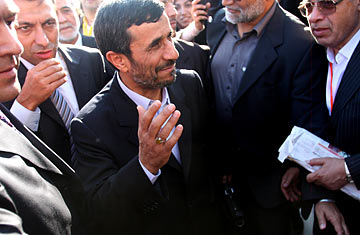
Iranian President Mahmoud Ahmadinejad leaves a meeting of the Organization of the Islamic Conference in Istanbul.
(2 of 2)
China, whose own energy economy is increasingly entwined with Iran's, is even more opposed to sanctions for reasons of national interest. Neither country sees Iran as representing any kind of imminent nuclear weapons threat, although if it remains uncooperative with the IAEA, the accepted guardian of the international non-proliferation regime, they could be compelled to support further sanctions; but even then, their own concerns would likely prompt them to accept only measures with limited impact.
Moscow is, however, using its own leverage to press Tehran to be more accommodating. Last Monday, its energy minister Sergei Shmatko announced that the nuclear reactor being built by Russia at Bushehr won't go online by its December 2009 deadline. (The reactor was first scheduled to begin producing electricity in the year 2000, and has been delayed five times since then.) Moscow has further annoyed Tehran by stalling on the delivery of the sophisticated S-300 air defense system ordered by Iran, whose deployment would make life difficult for any air force to attack the Islamic Republic.
Shmatko cited "technical reasons" for the Bushehr delay, but no one in Iran missed the signal. "The Russians are insincere and very unreliable and de facto using the Bushehr case as a political tool for realizing their interests with the West," Mahmoud Ahmadi-Biqash, spokesman of Iran's parliamentary foreign policy and security commission told an Iranian news service.
Turning up the heat in order to force a more cooperative attitude from Iran to the Vienna proposal, could actually stiffen Iran's resistance to the idea of shipping its uranium to Russia for reprocessing. More importantly, Iran is caught in a fierce domestic power struggle that militates against a clear and coherent strategy in the nuclear talks. Still, it recognizes that the goals of the Russians and Chinese are different from those of the U.S., France and Britain, all of whom continue to insist that Iran give up all uranium enrichment. Beijing and Moscow want to defuse the crisis and avoid confrontation. And they're also likely to be more comfortable with an outcome that sees Iran keep its uranium enrichment operations, but under stricter international monitoring and supervision. Indeed, that's the thrust of a secret deal that a British newspaper last weekend reported was being touted by outgoing IAEA chief Dr. Mohammed ElBaradei.
Such arrangements are anathema to the key Western powers, of course. But the key leaders in Tehran don't appear to feel a wall at their backs on the nuclear issue. Mottaki's insistence that Iran accepts the "framework" of the deal and Ahmadinjead's declaration last weekend that the Islamic Republic is committed to "nuclear cooperation" with the international community suggests that they know they'll have to show flexibility and deal, but they may still believe they can strike a more favorable agreement — or withstand the level of pressure the U.S. and its allies can muster in the months ahead. It's a dangerous game, but it may yet have many months to run — and its outcome is far from settled.
